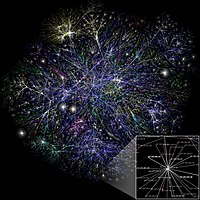The basic ideas of Precision Universal Debate were developed independantly of Debatepedia whose objective is the same as the former. However PUD goes beyond the limits of the latter towards a more "scientific" understanding of how knowledge is presented. RS
The following comes from the P2P Foundation
Debatepedia is the new "wiki" encyclopedia of arguments and debates.
URL = http://debatepedia.org/
Google listings in connection with the above subject
More Google listings/Debatepedia
Description
"It allows users to objectively frame public debates as they exist (not how they would like them to exist) in the public sphere between the relevant players. It enables the public to present the pro and con arguments that have been by scholars, experts, leaders, etc. It also empowers editors to present the overall positions of politicians, think-tanks, interest and activist groups, foreign leaders, etc. It does not allow users to present their own arguments. Debatepedia helps resolve an outstanding question: how can "wiki" technology be successfully applied to politics (divisive by nature), when "wikis" are a medium of consensus. The important insight and bridge is that a public debate and its public arguments can be treated as documentable facts, and that the public can arrive at a consensus in the framing of these facts. It is also important to note that Debatepedia enables the public to present all of the information necessary for an individual to develop a rational position." (Founder Brooks Lindsay)
Tuesday, April 8, 2008
A reporter from Wikinews recently interviewed Brooks Lindsay, who is the founder of the online wiki Debatepedia, which claims to be the 'Wikipedia of Debates.'
Brooks told Wikinews that "Debatepedia is a non-profit, free wiki encyclopedia of debates, pro and con arguments, and supporting evidence and quotes from scholars, experts, and op-ed writers (those figures that are actively engaged in these public debates)." He continued with "some people have called it the 'Wikipedia of debate', which is a pretty accurate description of what we are trying to do."
He finished by stating that the site is "trying to cover all of the pro and con arguments in any public debate, on any topic from a global to a local level, from any region in the world, and hopefully, in the future, in any language. The objective is to frame debates in a pro/con structure - when they appropriately belong in a pro/con structure - so that people can effectively "weigh" the "sides" in a debate, deliberate, draw conclusions, and take a stand. "
The second question asked why he founded Debatepedia. He replied by saying that "With arguments, evidence, and quotes being scattered across the Internet, it is currently too difficult for citizens to view all the pros and cons, quotes, and supporting evidence in debates, deliberate and take a stand. We are trying to fill this void, on a global scale, and by open-sourcing the effort over MediaWiki software."
When asked how Debatepedia will develop in the future Brooks said that he expects "the community of editors to grow to a much greater extent." He also said that he hoped to be able to "clean up some of the software elements," of the site.
When questioned about the importance of Debatepedia, Mr. Lindsay said that "Debatepedia is important for the reader and citizen as a tool to deliberate more effectively, develop greater conviction in what is righteous and what is not, and to generally increase citizen-engagement in debates, issues, and advocacy, across the world. For the writer, it is a way to have a greater voice and impact on other people, and other people's thinking; it's a great public service to help edit on Debatepedia, like on Wikipedia. Finally, there is the potential that Debatepedia will be used by leaders and representatives as a way to deliberate through a topic that they have to vote on, or as a destination to direct constituents to deliberate." He said it was "perhaps a lofty goal, but real nevertheless."



No comments:
Post a Comment